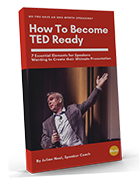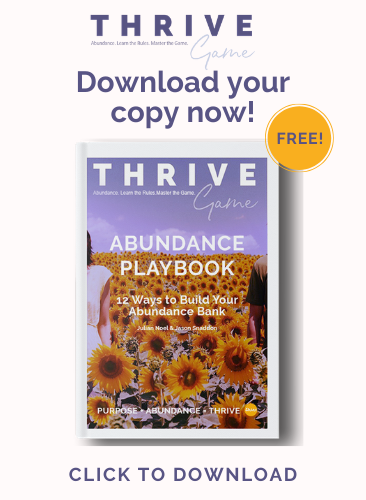You’ll never never know if you never never go.
75% of adults do not achieve their goals. Why? What do the 25% do that makes the difference?
Research by Dr. Stephanie Burns Phd., a globally respected educator and human performance expert, reveals a great deal of fascinating information on the relationship between the human brain and emotions in our ability to achieve meaningful goals. In her research she chose people who were highly skilled and had the resources (time, money and motivation) to achieve their self-selected, important goals.
Her study revealed two significant things: goal achieving requires us to experience emotions we’d rather not feel, and the human being is not designed to be in action.
Yep, you read that right. When she researched the brain’s hardwiring (the amygdylla or reptilian brain), she discovered that we humans are hardwired to be at rest. The amygdylla is responsible for our deepest seated animal/physical responses. We are still governed by our animal response of fight or flight, when we are not in life-threatening danger, the human body is designed to be at rest. Phew. I was so relieved to hear that, I could now tell my mother the scientific reasons behind why I had whiled away my youth watching TV, videos, old movies, snoozing, avoiding housework, boom! Mum there just weren’t enough sabre toothed tigers to get my fight or flight response ticking over. My laziness was explained. Yawn, all this writing is making me tired.
Stephanie also researched the role emotions play in setting and achieving purposeful goals. A bald fact is, most of us stop moving towards our meaningful goals because we become uncomfortable emotionally. Stephanie called learning, having a ‘not you’, experience’.
‘As adults’, she said, ‘we’ve spent a lifetime crafting an identity. Goals that stretch us call for us to experience and learn new things’. We are creatures of habit, scared of the new. The experience of vulnerability is disturbing to our nervous system. As children we delighted in ‘the new’ but as we grow older we learn what it is to try something and ‘fail’, and our willingness to explore declines’’. Sadly our horizons shrink.
So what is it that the 25% do that has them shine?
As part of Stephanie’s mentorship program I was encouraged to take up two goals. One I could choose on the proviso it was a goal that I would never normally undertake. The other was a goal she would select and the whole group would all participate in together.
Choosing my personal goal had me wavering between ballroom dancing (stop laughing, you know who you are!) or swimming 1.5 kilometres in an oceanside pool, three times per week, through winter. I am a poor swimmer and afraid of water. Watching that Aussie movie about ballroom dancing scared me off – the whole weird world of flouncey-shirted-strange-moustachioed dance teachers just made me too uncomfortable. Not much of a choice. But ballroom dancing was an emotion too far for me. I opted for the freezing conditions and swimming in winter. Would I be able to achieve that goal? I was both determined and doubtful at the same time.
The group goal was to be Stephanie’s surprise. On the designated day she declared we were all going to enrol in Tae Kwan Do classes… and in three months we’d be going for our yellow belt grading.
’Tae Kwan Do’ I thought to myself… long pause, ‘Tae Kwan Do? Tae Kwan Do, Tae Kwan Do’. I tried rolling the words around in my mouth. They didn’t fit. ‘I would rather drink a cup of my own sick, than do Tae Kwan Do’.
So, I was having a perfect ‘Not Me’ experience! My amygdylla, sensing a sabre toothed tiger, was on full alert.
Some of us, making very reasonable, sensible excuses, left the program at this point (obviously preferring the cup of sick option). You get my drift about the ‘not you’ experience. Ego is not a dirty word, but it sure is a powerful one. Goal achieving Lesson #323…. achieving requires you to be ‘unreasonable’ with yourself.
Stephanie said there 4 critical phases to goal achievement.
1. Choosing the goal
2. Initiating action
3. Maintaining activity towards the goal
4. Completion
We all discovered that emotions and our accompanying negative internal dialogue (forever remembered as NID) played a vital role in each of these phases and certain personalities excelled at differing stages of goal achievement.
Beware when choosing a goal that you do not deselect what you really want to do. Oftentimes we chose lesser goals as we do not ‘believe’ we can achieve what is really calling us. Choice is mostly governed by our past experiences. Beware. Be unreasonable. Follow your deepest calling, no matter what your NID says. When working directly with people I always get them to tune in to their intuition as a way to choose their goals. Get out of your head, into your heart, it is a more powerful form of guidance.
Initiating a goal is often the hard yards requiring tremendous effort. Just as a rocket burns up 95% of its fuel leaving the earth’s atmosphere, so too are we required to make a tremendous effort in establishing new behaviours, rhythms, acquire new skills, and all the while receiving very little reward. Lots of people begin thinking, ‘This is waaaaaaay too tough. I was crazy to start this’, and believing it will not get easier, they stop.
In the initiation phase, breathe, allow yourself time to integrate your new behaviours and absorb the learnings. In order to reach a new level of performance, you have to enter into a series of ‘not you’ experiences and in the process, your self-identity freaks out and seeks to regain control. Hmmmm, it is a battle that must be fought. I find meditation a great ally. It keeps me attuned to a quiet resourceful place beyond my wildest emotions, and they do get wild! I hope you can rest easy in the knowledge that it is hard to start, but that it does get easier…. most times (sorry, couldn’t resist that).
Maintaining momentum. Once you’re through the early phase, regular systematic action is required to carry you closer to your prescribed goal. This is often a steady and regular process. Some people love the routine and flourish. Me? Nope. I am a great initiator. Love starting things…. however I get bored in phase two. This is the time when you have worked out the two or three simple actions required to make your goal a reality. It is best to diarise and manage your actions at this stage.
As a group we all ‘buddied up’ and met and spoke regularly with our buddy. This is something I have continued to this day and warmly suggest, recommend, no DEMAND, you do. A buddy is one of the most powerful strategies I know. It works for several reasons. Being accountable to another makes us step beyond where we would normally stop. All our best work sits outside of our comfort zone.
So, get yourself a buddy. NOW! Then sit down, get real with each other, read this blog, discuss it, share your goals, actions and the activities you are going to achieve in the coming weeks.
Then, GO DO IT…. and in a week or so catch up and share your results.
Have fun!







